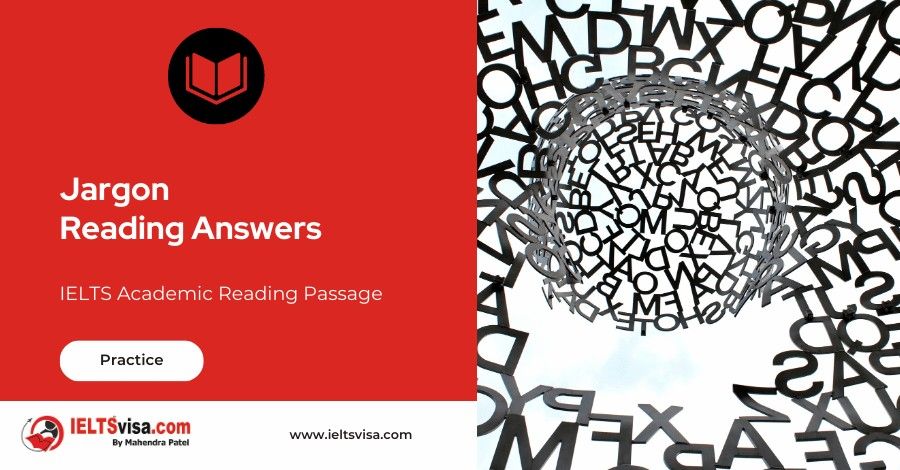Jargon Reading Answers
IELTS Academic Reading Passage

A. Jargon is a loaded word. One dictionary defines it, neatly and neutrally, as ‘the technical vocabulary or idiom of a special activity or group’, but this sense is almost completely overshadowed by another: ‘obscure and often pretentious language marked by a roundabout way of expression and use of long words’. For most people, it is this second sense which is at the front of their minds when they think about jargon. Jargon is said to be a bad use of language, something to be avoided at all costs. No one ever describes it in positive terms (‘that was a delightful piece of rousing jargon’). Nor does one usually admit to using it oneself: the myth is that jargon is something only other people employ.
B. The reality, however, is that everyone uses jargon. It is an essential part of the network of occupations and pursuits that make up society. All jobs present an element of jargon, which workers learn as they develop their expertise. All hobbies require mastery of a jargon. Each society grouping has its jargon. The phenomenon turns out to be universal – and valuable. It is the jargon element which, in a job, can promote economy and precision of expression, and thus help make life easier for the workers. It is also the chief linguistic element which shows professional awareness (‘know-how’) and social togetherness (‘shop-talk’).
C. When we have learned to command it, jargon is something we readily take pleasure in, whether the subject area is motorcycles, knitting, cricket, baseball or computers. It can add pace, variety and humour to speech – as when, with an important event approaching, we might slip into NASA-speak, and talk about countdown, all systems go, and lift-off. We enjoy the mutual showing-off which stems from a fluent use of terminology, and we enjoy the in-jokes which shared linguistic experience permits. Moreover, we are jealous of this knowledge. We are quick to demean anyone who tries to be part of our group without being prepared to take on its jargon.
D. If jargon is so essential a part of our lives, why then has it had such a bad press? The most important reason stems from the way jargon can exclude as well as include. We may not be too concerned if we find ourselves faced with an impenetrable wall of jargon when the subject matter has little perceived relevance to our everyday lives, as in the case of hydrology, say, or linguistics. But when the subject matter is one where we feel implicated, and think we have a right to know, and the speaker uses words which make it hard for us to understand, then we start to complain; and if we suspect that the obfuscation is deliberate policy, we unreservedly condemn, labelling it gobbledegook and calling down public derision upon it.
E. No area is exempt, but the fields of advertising, politics and defence have been especially criticised in recent years by the various campaigns for Plain English. In these domains, the extent to which people are prepared to use jargon to hide realities is a ready source of amusement, disbelief and horror. A lie is a lie, which can be only temporarily hidden by calling it an ‘inoperative statement’ or ‘an instance of plausible deniability’. Nor can a nuclear plant explosion be suppressed for long behind such phrases as ‘energetic disassembly’, ‘abnormal evolution’ or ‘plant transient’.
F. While condemning unnecessary or obscuring jargon in others, we should not forget to look out for it in ourselves. It is so easy to ‘slip into’ jargon, without realizing that our own listeners/readers do not understand. It is also temptingly easy to slip some jargon into our expression, to ensure that others do not understand. And it is just as easy to begin using jargon which we ourselves do not understand. The motivation to do such apparently perverse things is not difficult to grasp. People like to be ‘in’, to be part of an intellectual or technical elite; and the use of jargon, whether understood or not, is a badge of membership. Jargon, also, can provide a lazy way into a group or an easy way of hiding uncertainties and inadequacies: when terminology slips plausibly from the tongue, it is not essential for the brain to keep up. Indeed some people have developed this skill to professional levels. And certainly, faced with a telling or awkward question, and the need to say something acceptable in public, slipping into jargon becomes a simple way out, and can soon become a bad habit.
Questions 1-6
Reading Passage 1 has six paragraphs, A – F.
Choose the correct heading for each paragraph from the list of headings below.
Write the correct number i – ix in boxes 1 – 6 on your answer sheet.
List of Headings
i. The benefits of simple language
ii. A necessary tool
iii. A lasting way of concealing disasters
iv. The worst offenders
v. A deceptively attractive option
vi. Differing interpretations
vii. Publicising new words
viii. Feeling shut out
ix. Playing with words
1 Paragraph A
2 Paragraph B
3 Paragraph C
4 Paragraph D
5 Paragraph E
6 Paragraph F
Questions 7-12
Complete the summary using the list of words A-L below.
Write the correct letter A- L in boxes 7 – 12 on your answer sheet.
The Up Side of Jargon
Jargon plays a useful part in many aspects of life including leisure. For example, when people take up pastimes they need to develop a good 7……………………………of the relevant jargon. During the discussion of these or other areas of interest, the conversation can become more exciting and an element of 8……………………….can be introduced by the use of shared jargon. Jargon is particularly helpful in the workplace. It leads to more 9……………………….in the way colleagues communicate during work hours. Taking part in 10……………………….during moments of relaxation can also help them to bond better. It is interesting that members of a group, whether social or professional, often demonstrate a certain 11……………………….. towards the particular linguistic characteristics of their subject area and tend to regard new people who do not wish to learn the jargon with 12…………………..
|
A. judgment |
B. jokes |
C. shop-talk |
|
D. efficiency |
E. know-how |
F. command |
|
G. contempt |
H. feeling |
I. possessiveness |
|
J. pleasure |
K. fear |
L. humor |
Questions 13
Choose the correct letter, A, B, C or D.
Write the correct letter in box 13 on your answer sheet.
13Which of the following statements would the writer agree with?
A Jargon thoroughly deserves the bad reputation it has gained.
B Jargon should not be encouraged except in the workplace.
C Jargon should not be used if the intention is to exclude others.
D Everyday life would be very much better without jargon.

Solution For: Jargon
Reading Answers
| 1. vi | 8. L |
| 2. ii | 9. D |
| 3. ix | 10. C |
| 4. viii | 11. I |
| 5. iv | 12. G |
| 6. v | 13. C |
| 7. F |
Review and Practice
- Regularly practice with IELTS reading samples and time yourself to get used to the pressure of the exam.
- Review your mistakes to understand where you went wrong and how to avoid similar errors in the future.
Our Books
Master IELTS Speaking Part 1
IELTS Writing Task 1 Book
IELTS Writing Task 2 Book
Jargon Reading Answers Explanation
Comin Soon
Practice IELTS Other Modules
IELTS Listening
The IELTS Listening test assesses how well you can understand spoken English in various contexts. It lasts about 30 minutes and is divided into four sections with a total of 40 questions. The listening tasks become increasingly difficult as the test progresses.
IELTS Academic Reading
The IELTS Academic Reading section assesses your ability to understand and interpret a variety of texts in academic settings. It is designed to evaluate a range of reading skills, including skimming for gist, reading for main ideas, reading for detail, understanding inferences, and recognizing a writer's opinions and arguments.
IELTS Speaking
The IELTS Speaking test assesses your ability to communicate in English on everyday topics. It lasts 11-14 minutes and consists of three parts: introduction, cue card, and a discussion based on the cue card topic.
IELTS General Reading
IELTS General Reading tests your ability to understand and interpret various types of texts. Here are some key areas and types of content you can expect to encounter in the reading section, along with tips for effective preparation.
IELTS Academic Writing Task 1
In IELTS Academic Writing Task 1, you are presented with a visual representation of information, such as graphs, charts, tables, or diagrams, and you are required to summarize, compare, or explain the data in your own words.
IELTS General Writing Task 1
In IELTS General Writing Task 1, you are required to write a letter based on a given situation. The letter can be formal, semi-formal, or informal, depending on the prompt. Here’s a breakdown of the key components to include in your letter
IELTS Academic Writing Task 2
In IELTS Academic Writing Task 2, you are required to write an essay in response to a question or topic. Here’s a guide to help you understand the essential elements of this task
IELTS Exam Tips
To succeed in the IELTS exam, practice regularly, familiarize yourself with the test format, improve your vocabulary, develop time management skills, and take mock tests to build confidence.
Grammer for IELTS
Grammar is the foundation of effective communication in English. Understanding tense usage, subject-verb agreement, and sentence structure enhances clarity and coherence in writing and speaking.
Vocabulary for IELTS
Vocabulary plays a crucial role in the IELTS (International English Language Testing System) exam, especially in the Speaking and Writing sections. Here’s an overview of why vocabulary is important and how it impacts your performance
RECENT IELTS SAMPLES QUESTIONS AND ANSWERS
Walking with dinosaurs
Peter L. Falkingham and his colleagues at Manchester University are developing techniques that...
Money as the Unit of Amount Reading Answers
The most difficult aspect of money to understand is its function as a unit of account. In...
WEATHERING IN THE DESERT
In the deserts, as elsewhere, rocks at the earth's surface are changed by weathering, which...
Nature on Display in American Zoos
The first zoo in the United States opened in Philadelphia in 1874, followed by the Cincinnati...
Can We Prevent the Poles From Melting
Such is our dependence on fossil fuels, and such is the volume of carbon dioxide we have...
Air conditioning the earth reading answers
The circulation of air in the atmosphere is activated by convection, the transference of heat...













